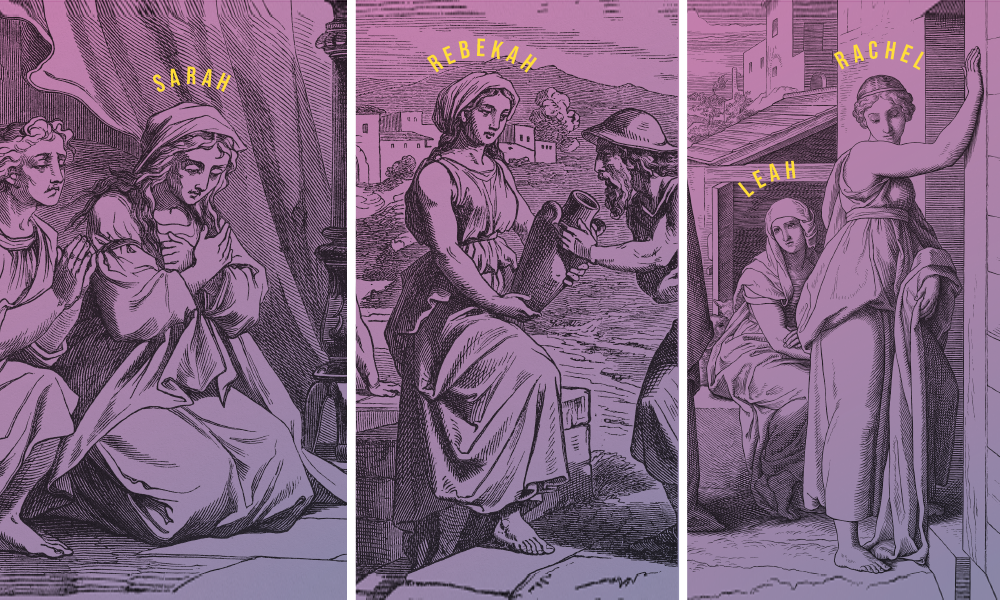
The strength of the four matriarchs
But God said to Abraham … Obey Sarah, no matter what she asks of you; for it is through Isaac that descendants will bear your name.” (Gen 21:12)
But God said to Abraham … Obey Sarah, no matter what she asks of you; for it is through Isaac that descendants will bear your name.” (Gen 21:12)
Four women are generally recognized as the Matriarchs of the Jewish faith: Sarah, Rebekah, Rachel and Leah. The children of these three generations of women would eventually lead to the formation of the 12 tribes of Israel.
Four women are generally recognized as the Matriarchs of the Jewish faith: Sarah, Rebekah, Rachel and Leah. The children of these three generations of women would eventually lead to the formation of the 12 tribes of Israel.
The matriarchs at a glance
Sarai was married to Abraham, a patriarch of three world religions today. She was unable to bear children, however, which created a rather perplexing problem for the couple as they grew old. God had promised to make them the father and mother of a multitude of nations. God had even changed Sarai’s name to Sarah as a sign of this promise. Against all odds, Sarah would indeed give Abraham, who had turned 101 years old, a son, Isaac.
Isaac would marry Rebekah, but they were also childless for many years. Eventually, however, God would answer Isaac’s prayer for children as Rebekah would give birth to twins: Esau and Jacob. Jacob, in turn, would marry the sisters Leah and Rachel. Together, Leah and Rachel would be responsible for giving Jacob, whose name God changed to Israel, 12 sons and one daughter. The 12 sons would lead to the founding of the 12 tribes of Israel.
Finding their voices
Each of these women found themselves in situations where they needed to speak up for their own dignity. For example, Sarah had to advocate for her place in Abraham’s life after her servant, Hagar, had given Abraham a son. Apparently, Sarah felt Hagar had begun to look down on her and threatened to supplant her.
Rebekah found her voice in the decision to marry Isaac. At that time, a woman’s consent was not required for a marriage if it was arranged by her father. However, Rebekah’s father had passed. Her brother, Laban, was brokering the marriage to Isaac, and he wanted her to stay with the family for a while longer. It was Rebekah who decided to leave her family and travel to Isaac.
In like manner, Leah had to fight for her standing in the marriage to Jacob. As the older of the two sisters, she had been given to Jacob through the trickery of her father. Jacob loved and had only desired marriage with Rachel. Despite bearing Jacob many children, Leah often found herself at a disadvantage. Since Rachel was not bearing Jacob children, her self-advocacy took the form of prayer. Eventually, her prayers were answered and she bore Jacob two sons: Joseph and Benjamin.
Matriarchal advice and advocacy
At other times, the matriarchs directed their advocacy efforts and applied their wisdom to benefit their children. Born from faithfulness to God’s promise to her and Abraham, Sarah protected Isaac’s inheritance using her influence with Abraham, even to the point of having Hagar and her son, Ishmael, driven into exile.
Rebekah exercised her shrewdness at least twice to safeguard her son, Jacob. When she carried the twins in her womb, God told her that the “older will serve the younger.” (Gen 25:23) She interpreted this as bestowing God’s favor on Jacob, a secret she apparently kept to herself. When the proper time came, she orchestrated the deception that led to Isaac giving his blessing to Jacob instead of Esau out of obedience to God’s will.
Of course, Esau was not too happy about the situation and threatened to kill Jacob. When Rebekah heard this, she persuaded Isaac to send Jacob away so he could marry within the family, thereby saving Jacob’s life and giving both Esau and Isaac time to cool off.
Throughout many trials, the resilience and forbearance of the matriarchs were on full display. Their lives witness to what is possible when we remain faithful to God’s promises.
Did You Know?
Three of the matriarchs (Sarah, Rebekah and Leah) are believed to be buried at the Tomb of the Patriarchs in Hebron, a city in the southern West Bank. The Book of Genesis recounts that Rachel died after giving birth to Benjamin as she and Jacob were traveling toward Hebron. Consequently, Rachel’s tomb is a few miles from Hebron just outside of Bethlehem.
Doug Culp is the chancellor for the Catholic Diocese of Lexington.



